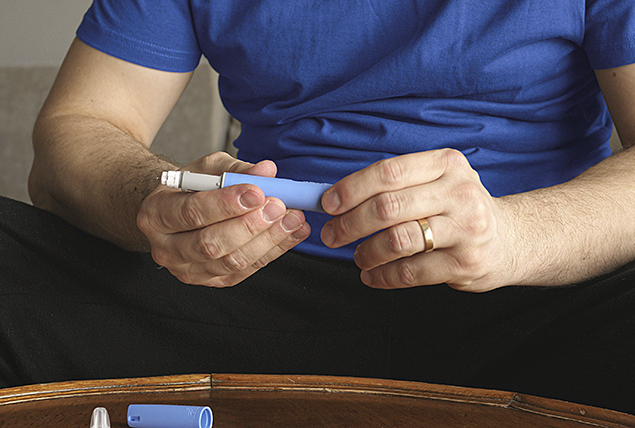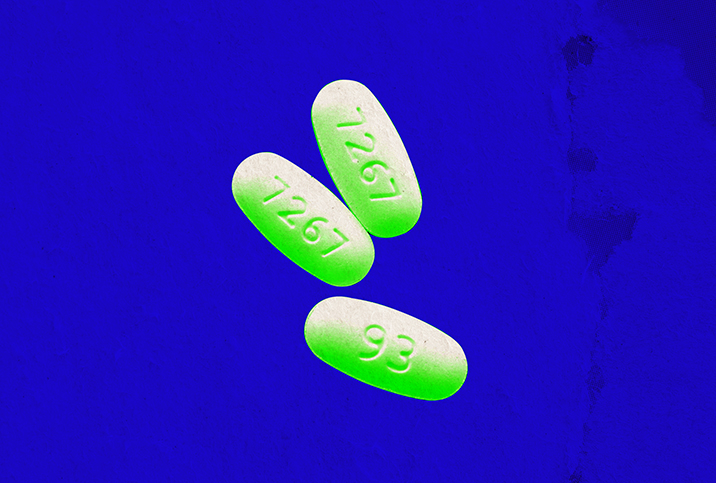Ozempic Doesn't Raise Risk of Suicidal Thoughts, Study Suggests

Key Points
- The FDA and European regulators are investigating anecdotal reports that Ozempic's active ingredient, semaglutide, may be linked to an increase in suicidal ideation, as well as hair loss and aspiration.
- A new large-scale study found people taking semaglutide were less likely to experience suicidal thoughts compared to those taking other medications for weight loss or diabetes, such as bupropion or metformin.
- More clinical trials are needed to evaluate the potential risks and long-term effects of semaglutide and similar drugs.
Separating weight-loss facts from fiction can be challenging. Given the prevalence of obesity and the commercial value of fad diets, fitness coaching and fat-loss supplements, the average American is inundated with information about body size and how to change it.
One thing is certain. People trying to lose weight can find it difficult to achieve.
Can taking Ozempic cause suicidal ideation?
Initially designed to treat type 2 diabetes, GLP-1 receptor agonists such as Novo Nordisk's brand-name drugs Ozempic and Wegovy have become popular for their ability to help people shed pounds quickly.
The U.S. Food and Drug Administration (FDA) has approved the GLP-1 agonists Wegovy, Zepbound and Saxenda to treat and reduce the risk of obesity. Other GLP-1 agonists such as Mounjaro and Ozempic are sometimes prescribed off-label for this same purpose.
These medications are generally considered safe, but regulators in the U.S. and Europe are now investigating whether they may raise the risk of first-time or recurrent suicidal thoughts.
Ozempic and Wegovy's active ingredient, semaglutide, mimics GLP-1, a hormone the body makes to slow down digestion. Doing so can help manage blood sugar and reduce hunger, supporting weight loss.
Tirzepatide, the active ingredient in the brand-name drugs Mounjaro and Zepbound, works similarly.
The definition of obesity is an adult with a body mass index (BMI) of 30 or higher, according to the Centers for Disease Control and Prevention (CDC). Unusually muscular people may have a BMI over 30 and not be overweight, but this is relatively rare.
An estimated 24 million people in the United States—roughly 7 percent of the population—will take these medications by 2035, according to research by Morgan Stanley.
Authorities in North America and Europe have received anecdotal reports of adverse events.
The reports associated with semaglutide include the following:
- Suicidal thoughts
- Hair loss
- Aspiration (when food or liquid accidentally enters the lungs)
In response, the European Medicines Agency (EMA) opened an investigation in the summer of 2023, and the FDA announced it's doing the same.
Clinical trials have established multiple possible side effects of GLP-1 agonists, including:
- Gastrointestinal issues (2023 report)
- Increased heart rate (2017 study)
- Elevated risk of pancreatitis (2023 study)
- Gastroparesis, or paralysis of the stomach
Less is known about the potential impact of GLP-1 agonists on mental health. Some users have reported experiencing an increase in suicidal ideation when taking semaglutide, but authorities note that these effects may stem from underlying health conditions, not the medications.
Research indicates people with obesity or type 2 diabetes are at higher risk of depression, for example, as indicated by a 2000 report. Additionally, most people try diets to shed extra pounds before turning to medications.
Diets are often ineffective, and one of the dangers of dieting is it can exacerbate or contribute to eating disorders, which are closely linked to depressive and anxiety disorders.
Depression isn't the sole cause of suicidal thoughts or actions, but it is often a factor, according to a 2018 report.
Recommended
- Physician-Recommended Strategies That Can Help You Lose Weight: From nutrition to exercise to surgical procedures, there are healthy ways to shed pounds.
- Dieting Poses Serious Hidden Dangers: You are what you eat—and that's not always a good thing.
- The Impact of Obesity on Sexual Health Is Significant: Being overweight can create issues with erectile function, performance and fertility.
More research is helpful
A new large-scale study of nearly 1.8 million consumers may help alleviate concerns regarding Ozempic and suicidal ideation. It's the first to examine the potential link between semaglutide and suicidal thoughts.
Researchers found people who took Ozempic or Wegovy were 49 percent to 73 percent less likely to experience suicidal thoughts compared to those who took other weight-loss or diabetes drugs that didn't contain semaglutide.
Comparator medications included bupropion, naltrexone and orlistat for weight loss, and metformin for diabetes. The study, backed by the National Institutes of Health (NIH) and co-led by researchers at Case Western Reserve University and the National Institute on Drug Abuse (NIDA), was published January 5, 2024, in Nature Medicine.
The researchers analyzed health data from more than 240,000 people with obesity and more than 1.5 million people with type 2 diabetes. They evaluated patients' risk of suicidal thoughts within six months of starting their medication and at other time points up to three years.
At six months, the risk of first-time suicidal ideation was 73 percent and 64 percent lower among patients taking Wegovy for weight loss and Ozempic for diabetes, respectively. Researchers also found that people with a history of suicidal ideation were 56 percent and 49 percent less likely to have recurrent thoughts of suicide when taking Wegovy or Ozempic, respectively, compared to people who weren't taking GLP-1 agonists.
Researchers reported patients on Ozempic or Wegovy continued to have fewer thoughts of suicide throughout the three years compared to those on other medications. This was a retrospective observational study, however, so it couldn't determine cause and effect.
Why did the FDA investigate Ozempic usage and suicidal thoughts?
Consumers, product manufacturers, healthcare providers and others in the U.S. can report newly identified potential side effects to the FDA Adverse Event Reporting System (FAERS). If the FDA determines a "signal of a potential safety issue" associated with a particular drug, it adds the drug and its possible risk to a list it publishes quarterly.
Semaglutide and its potential link to suicidal ideation appeared on the FAERS list for the period July to September 2023.
The FAERS website notes that a drug's inclusion on the list doesn't indicate the FDA has concluded that the drug has the associated risk. It does mean the federal agency has recognized the potential need to investigate further and "evaluate the need for regulatory action."
Such actions may include updating labels or developing a Risk Evaluation and Mitigation Strategy to help ensure a drug's benefits outweigh the risks of adverse effects and potential complications.
What happens if you take too much Ozempic?
Just as many fad diets are unhealthy and can have serious adverse effects, so can taking too much weight-loss medication.
Most potential side effects of GLP-1 agonists are mild and temporary, according to Mayo Clinic. However, taking more than the recommended dosage can have severe consequences.
Mayo Clinic lists the following as possible complications of a semaglutide overdose: gastrointestinal issues, hypoglycemia (low blood sugar), injection site reactions and pancreatitis.
Gastrointestinal issues
Nausea, vomiting, diarrhea and similar gastrointestinal problems are common with semaglutide. An overdose could make them worse, potentially leading to dehydration. Symptoms of dehydration include extreme thirst, dry skin, dizziness and dark urine.
Hypoglycemia
Like other diabetes drugs, GLP-1 agonists can lower blood sugar. If one's blood sugar gets too low, immediate attention is required. Signs of hypoglycemia include sweating, shakiness, irritability, blurred vision, headache, and, in extreme cases, seizures or loss of consciousness.
Injection site reactions
Some GLP-1 agonists, such as Wegovy and Ozempic, must be injected into the body. Taking too much semaglutide may raise the risk of an injection site reaction, such as redness, swelling or itching.
Pancreatitis
In a few cases, semaglutide has been linked to pancreatitis. Potential signs of pancreatitis include severe abdominal pain, nausea and vomiting.
The bottom line
Medications for weight loss or diabetes can be a vital part of treatment for people who need them. They may be a safer alternative to bariatric weight-loss surgery and a lifeline for those who have not had success with diet and exercise alone.
These medications aren't a quick fix, nor are they suitable for everyone.
Talk to your doctor to learn more about the benefits and risks of weight-loss medications. Keep your healthcare professional in the loop about any side effects you experience.














